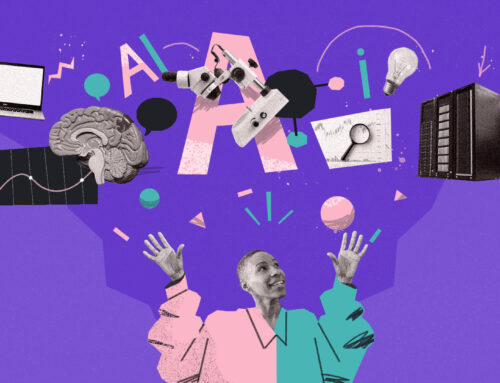Is AI taking over journalism? Are news reporters losing their jobs due to AI systems and tools? Will AI dominate the world of media and news organizations? These are some of the burning questions we often get to hear these days. The revolution of artificial intelligence might have changed the entire perspective of every industry, but has it also impacted journalists and the news industry? In this article, we will explore whether the use of generative AI in journalism is the future or rather an imminent threat to the reliability and efficacy of traditional news media sources.
Can AI Predict the News?

AI’s role in predicting news is an exciting development, but it’s important to manage expectations. With the increasing adoption of AI, there’s hope surrounding AI’s potential to transform journalism. AI-powered systems can analyze news articles, companies’ financial reports, and social media conversations in real-time. This sentiment analysis helps investors and financial institutions gauge market sentiment and make accurate predictions. However, AI’s predictions are based on patterns in historical data and algorithms, so its accuracy can be limited.
In journalism worldwide, AI tools like machine learning algorithms are used in the newsroom for production and distribution. They help news organizations by generating content, analyzing reader preferences, and optimizing delivery. AI, without the pressure of being perfect, can support high-quality journalism. The current level of artificial intelligence is capable of making predictions based on patterns and trends in data, but its ability to predict the future is limited by factors like data quality and availability. Access to AI and new AI technologies allows journalists to use AI strategies to enhance their work while keeping the human touch central to journalism. AI constitutes just one part of a broader set of tools that help make news more efficient and insightful.
Speaking of overall industry findings we came across some really interesting facts which suggest that AI and Journalists can work hand in hand.
Here take a look:
- 77% of news organisations reported cost savings due to AI implementation
- 68% of journalists said AI tools improved their overall productivity
- 91% of news executives believed AI would be crucial for the future of journalism
These findings suggest a clear roadmap for coexistence of AI and News reporters in the world of journalism and adoption of AI in multiple news outlets.
Keeping aside the technicalities of AI, would you be willing to read a piece of article if it seems to be a product of automated journalism? I mean, if it comes to me, journalism is more of a storytelling activity, which requires the essence of human touch. Journalists don’t just keep us updated about our surroundings but also shape our overall opinion towards the outside world. But this requires the ability to express emotions, context, concerns and overall mass judgement through words, which AI certainly cannot do without humans. AI might be a great storyteller but it also requires the facts to be complemented by human verification.
AI in Journalism: The Role of Algorithms in News Organizations
AI has a significant role to play in the field of journalism and mass communication. While AI is already influencing the journalism industry, access to technology is one thing, but properly implementing the AI infrastructure and algorithms that give the best results is what needs to be addressed first. As AI reshapes the news industry, it’s crucial to consider the implications of AI in news and how AI increases platform companies’ control over news content. We must also ensure that we possess the right kind of manpower resources who are receptive to new AI technologies and advanced methods of performing their daily jobs. Technology companies for AI are actively working on AI development and AI projects to improve journalism. Keeping that in mind, let me walk you through some of the key benefits of AI innovation in the news industry.
Personalisation
Tailored content is what drives the audience. Imagine delivering stock market insights to a toddler? Seems illogical, doesn’t it? That’s where personalisation steps in. Unlike old times, AI algorithms have evolved to understand the preferences of our daily readers, which has caused the news agencies to provide more personalised content to their viewers. Because of AI 72% of news consumers reported higher satisfaction with personalised news feeds and the average time spent on news apps increased by 28% due to better content targeting.
Personalisation has definitely brought about a significant change in the way news reporters bring news and deliver stories. By understanding individual interests, reporters have significantly increased their engagement rates and learned new ways to better organise their content recommendations. For example, agencies and publishers like New York Times use reading history to give tailored recommendations that in turn increases their click through rates.
Personalisation has become a necessity in every aspect of our lives. From writing emails to playing music, from watching Netflix to ordering food, algorithms already know what we want and when we want it. So why not our daily articles? Why not the journals we read? I mean, I like to be in touch with ongoing trends in the stock market so why am I not reading articles on which company’s stock just shot up? Why am I reading about a singer’s latest release? Would that satisfy my intent? Hell No!
Less Time, More Content
Sounds great, isn’t it? But wait, didn’t we say AI generated content lacks the human touch? Oh yes, it does, but at the same time reporters like us also cannot do without AI in this hustle and bustle. As a reporter who doesn’t rely on AI, how many articles can you write in a day? One? Two? Three? Or Five? But what if you used AI? Don’t worry, even AI won’t make you write a million articles a day, but think of how fast the process becomes. In less than 30 minutes, you will have a brand new report or article ready for your readers. All you have to do is feed in some content or even take the help of AI for collecting data.
With AI, not just writing becomes a piece of cake, but also the monotonous task of analysing large sets of data or reading huge piles of documents becomes a breeze. Collecting and analysing data not only requires less time and effort with AI but also the entire process becomes more accurate. For example, we all know ‘Quakebot’, an application developed by the Los Angeles Times, that detects and reports earthquakes in about a few minutes or even seconds. Can you imagine how this application might assist in saving millions of lives?
To get more information, we have also gathered some expert opinions which have a lot to say about Artificial Intelligence and its role in journalism. For instance, read what Tiago Pita, the eCommerce Director at Whole Food Earth, says about AI’s role in saving time and automating tasks.
“By automating data analysis, which speeds up the process of identifying patterns and anomalies in large datasets. It can sift through vast amounts of information quickly, highlight key insights, and reveal connections that might be missed manually. For example, AI tools can analyse financial records, social media data, and public documents to uncover hidden stories or corruption, significantly boosting the efficiency and depth of investigative reporting.”
Use of AI in Transcription & Translation
AI has changed the entire scenario of workflows by dramatically speeding up the process of transcription and translation. Earlier, reporters and journalists were solely dependent on manual transcription which had numerous downsides like errors, lack of accuracy, time-consuming, costly, etc. AI has overcome these challenges by making the entire process swift and budget friendly.
Unlike old times, transcribing an interview, press conference, etc is a breeze these days just because of AI tools. Not just in terms of accuracy, but this has also saved a lot of time making it easier for agencies to deliver news as the events unfold. One doesn’t need hours to transcribe a long conversation or podcast but can deliver real time reports with AI at their disposal. Newsrooms with high transcription needs can get a text version of their interviews in almost half the cost and time.
Moving forward to translation, we all know Artificial Intelligence is capable of generating content in any language we want. Think of this as an opportunity for news agencies to expand their reach to every nook and corner of the world. With a little bit of editing required by humans, news agencies can get more nuanced and contextually appropriate translations. This helps in reaching a wider audience in no time by overcoming language barriers.
Overall, AI has a positive role to play in ensuring more timely and efficient reporting at global level.
Why must AI and journalists coexist?
Is AI going to kill jobs in journalism too? Isn’t this what concerns you? Well, I think it can’t, not even in the future. I have a number of reasons why AI alone cannot dominate the journalism industry.

Human Touch and Creativity
AI can never match the level of human touch and creativity as journalists don’t just convey information, they also use their emotional intelligence to give shape to opinions and influence choices. Speaking of creativity, it doesn’t just come from witty phrases or catchy headlines but using language that resonates with the readers. Sentences produced by AI are often bland and reek of automation. Whereas, information written by AI combined with editing from Human writers can help in exploring different narrative styles that are more appealing to different sets of readers and reliable at the same time.
Investigative Abilities
Investigative writers are the backbone of journalism. Have you seen AI going around asking questions and interviewing people live? Do you see robots exploring sites of natural disasters or visiting homes to collect data? Even if they do in future, what are the odds of their data being accurate? I mean, can they really operate independently? No way! AI certainly lacks the intuitive abilities to carry out an on-the-ground investigation.
Besides, the world of journalism is quite dynamic and susceptible to unprecedented events. This calls for a quick response and adaptability which AI certainly can’t offer as it often requires pre-loaded information or instructions to operate.
Ethical Considerations and Reliability
Human oversight is a major drawback of information produced by AI. Without a set of instructions or pre-loaded guidelines AI can’t perform its functions and this creates a loophole for ethical biases to creep into the news produced by AI. When AI relies on Humans for instructions, there is a high probability of favouritism and cultural discrimination. AI certainly lacks the sensitivity that a human might exercise while reporting matters that can cause a spark among people belonging to certain cultures or social groups.
Even experts from different industries have claimed AI produced news and facts to be biassed and accused AI models of skewed reporting. Take a look at what Jon Morger, the CEO and Editor-in-chief of Venture Smarter, says about the reliability and ethical standards of AI in journalism:
“AI helps streamline the reporting process and retools the production and distribution of news, delivering timely information to readers. Yet, with these advancements come structural implications of AI and ethical considerations that news organizations must navigate carefully. One major concern is the potential for bias in AI-generated content, especially in forms of AI like generative AI models. Since algorithms rely on the data they are trained on, any biases present in the data can influence the output, potentially reinforcing existing inequalities among news sources. To combat this, news organizations use various measures, such as ensuring human editors review AI-generated pieces, maintaining transparency about AI’s role in the content creation process, and regularly updating the AI systems to reduce biases. The Reuters Institute for the Study of Journalism and AI companies emphasize the importance of quality journalism and the need to explore the conditions of news work around generative AI, while also understanding the ways in which AI without proper oversight could impact the industry, including its use on social media platforms.”
Well, if you read this article as a journalist or are exploring career opportunities in the field of journalism, I am pretty sure I have addressed most of your concerns. The increasing use of AI in journalism, including generative AI tools, in the production and distribution is transforming the industry, but it is crucial to recognize that AI will not automatically improve journalism. The complexity of AI increases platform control, and the concentration of control over AI by a small handful of companies could prioritize the welfare of AI products and services over journalism or the needs of news media executives. It’s important to strike a balance between AI-driven tools and traditional reporting methods since one kind of AI cannot do everything alone. The effects of AI will neither automatically improve journalism nor replace the need for ethical standards. By combining the strengths of AI with human abilities, one can build better general-purpose AI products and generative AI applications that enhance journalistic abilities while upholding the standards of ethical and reliable journalism. Current conversations around AI should focus on how AI in journalism could be helpful, and how to prioritize the welfare of journalism when it comes to AI.


